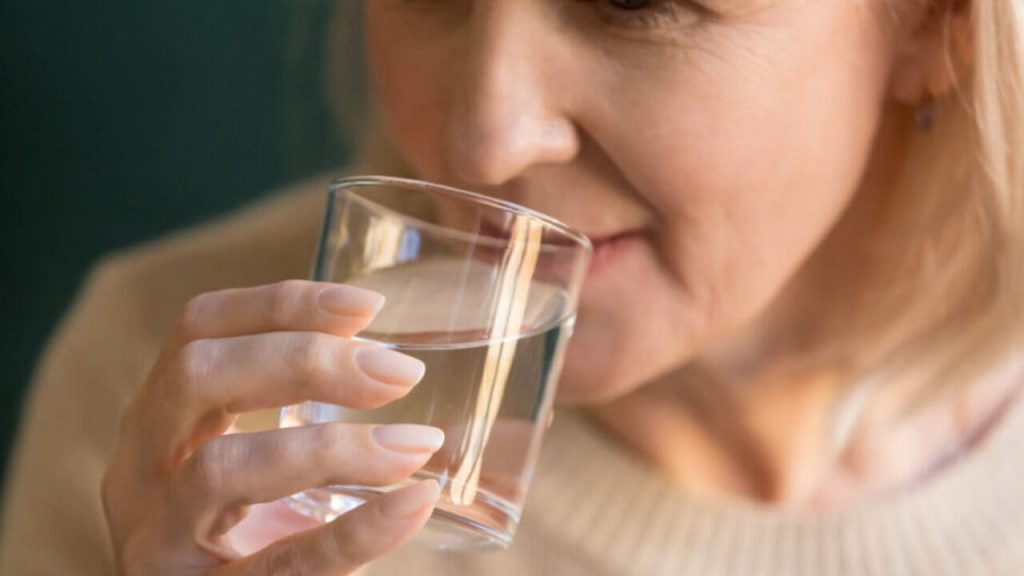When you are reading the nutrition label on a food product, you may see the term “water-soluble.” You may be wondering what this means and if it is something that you need to worry about.
In this post, we will explain water-soluble vitamins and minerals and tell you whether or not you need to be concerned about them.
What Does Water Soluble Mean?

Water soluble refers to the ability of a substance to dissolve in water. This term is most often used in chemistry, and it is used to describe how easily a substance can be dissolved in water.
In general, water-soluble substances are those that dissolve easily in water and form a homogeneous solution.
This means that the molecules of the substance are evenly distributed throughout the water.
Substances that are not water soluble will not dissolve in water and will instead remain as separate particles. Examples of water-soluble substances include salt, sugar, and baking soda.
On the other hand, sand is an example of a substance that is not water-soluble. When determining if a substance is water soluble, it is important to consider the properties of both the substance and water.
Water is a polar solvent, which means that it can only dissolve polar substances. This is because the molecules of polar substances have a negative and positive end, which allows them to interact with the molecules of water.
Non-polar substances, on the other hand, do not interact with water molecules and will not dissolve.
In addition, the solubility of a substance also depends on its molecular structure. Substances with small molecule sizes are more likely to be water-soluble than those with large molecule sizes.
How To Make Something Water Soluble?
If you need to dissolve a substance in water, the first step is to check if the substance is already water soluble. Many substances, such as salt and sugar, will dissolve easily in water.
If the substance is not water-soluble, you can try adding heat, stirring, or changing the pH of the water. You can also try using a solvent such as alcohol or acetone. However, if none of these methods work, you may need to use a surfactant.
A surfactant is a substance that lowers the surface tension of a liquid, allowing it to mix more easily with other substances.
When choosing a surfactant, be sure to select one that is compatible with both the substance you are trying to dissolve and the water you are using.
With a little experimentation, you should be able to find a method that will allow you to dissolve even the most stubborn substances in water.
What Are Some Common Water-Soluble Substances?
While there are many different types of chemicals, some substances are more soluble in water than others. This means that they can easily be dissolved in water and form a solution.
For example, table sugar is a common water-soluble substance. When sugar is added to water, it quickly dissolves and forms a sweet solution. Other common water-soluble substances include salt, baking soda, and vinegar.
These substances are often used in cooking or cleaning because they can easily be dissolved in water and provide desired results.
In contrast, oils and waxes are not water-soluble and will not dissolve in water. This means that they will not mix with water and form a solution.
For this reason, oils and waxes are not typically used in cooking or cleaning applications. Understanding which substances are soluble in water can be helpful in many different situations.
How Are Water-Soluble Substances Used In Various Industries?
Water-soluble substances have a wide range of uses in industry. In the food industry, they are used as preservatives, colorants, and flavorings.
In the cosmetics industry, they are used as emollients, solvents, and carriers. In the pharmaceutical industry, they are used as active ingredients, excipients, and vehicles.
Water-soluble substances are also used in the textile industry as dyeing assistants, finishes, and sizing agents. In the paper industry, they are used as retention aids, fillers, and coating agents.
In the construction industry, they are used as binders, admixtures, and plasters.
Water-soluble substances have many uses in industry because of their unique ability to dissolve in water. This property allows them to be easily transported and removed from surfaces.
Food Items That Contain Water-Soluble Vitamins And Minerals
Water-soluble vitamins and minerals are essential nutrients that the body needs to function properly.
However, these nutrients are not stored in the body and must be obtained through diet. There are many different food items that contain water-soluble vitamins and minerals, including fruits, vegetables, meats, dairy products, and grains.
Fruits and vegetables are especially good sources of these nutrients, as they are typically high in water content.
Some specific examples of fruits and vegetables that contain water-soluble vitamins and minerals include oranges, strawberries, broccoli, kale, and potatoes.
In addition to being found in fruits and vegetables, water-soluble vitamins and minerals can also be found in other food items such as meats, dairy products, and grains.
For example, vitamin B12 is found in meat and poultry, calcium is found in dairy products, and iron is found in both meat and grains.
While there are many different food sources of water-soluble vitamins and minerals, eating a variety of healthy foods is the best way to ensure that your body gets the nutrients it needs.
Benefits Of Using A Water-Soluble Substance
Water-soluble substances have many benefits. They can be easily dissolved in water, which means they can be easily transported and absorbed by the body.
In addition, they are less likely to cause side effects than other substances. Water-soluble substances are also less likely to interact with other medications.
For these reasons, water-soluble substances are often the preferred choice for people who need to take medication.
However, it is important to remember that water-soluble substances can also have disadvantages. They may not be as effective as other substances, and they may not last as long in the body.
What Are Some Potential Dangers Of Using A Water-Soluble Substance Incorrectly?
All substances have the potential to be dangerous if used incorrectly, but water-soluble substances are particularly dangerous because they can be easily absorbed into the body.
When this happens, it can cause dehydration, organ damage, and even death. For example, if someone consumes too much salt or sugar, their body will start to draw water from other tissues in an attempt to dilute the substance.
This can lead to dehydration and a drop in blood pressure. In severe cases, it can cause coma or death. Similarly, if someone inhales a water-soluble substance like chlorine gas, it can damage their lungs and lead to respiratory problems.
So while water-soluble substances are safe when used correctly, it is important to be aware of the potential dangers of using them incorrectly.
Additional Contents


